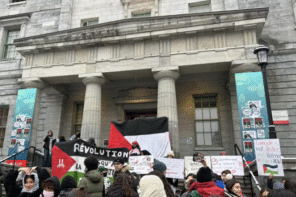On October 10, the Students’ Society of McGill University (SSMU) Legislative Council convened to debate a full agenda of motions.
Fossil Fuel Divestment
President Bryan Buraga moved a Motion Regarding Policy on Moratorium on McGill Fees Until Fossil Fuel Divestment. The approval of this motion would allow the SSMU to place a moratorium on considering new student fees or increases to existing fees proposed by McGill. The SSMU would only lift the moratorium should McGill agree to divest from its investments in the fossil fuel industry. Representatives from Divest McGill, C-JAM, and other sectors of the McGill community were present in the gallery to support this motion.
Arts Representative Adin Chan opened the debate period by asking how the motion’s passage might affect the SSMU’s relationship with the McGill administration. Vice President of University Affairs, Madeline Wilson, responded, “It is perfectly fine, and honestly expected, to degrade that relationship, especially when for multiple years [the McGill administration] have been pushing off the matter of divestment… I think we’re at the point at which we can ruin that relationship.” Wilson also emphasized that this moratorium would allow the student body to use their financial power to demonstrate a commitment to climate justice.
Some councillors expressed reservations about establishing a moratorium on student fees. Law Representative Beatrice Mackie raised the concern that leveraging student fees to put pressure on the administration would make “student services seem non-essential and open to politicization.”
Wilson countered this point, insisting that student services have always been politicized. “There will be pressure, which is the purpose of this motion, but students will not be impacted,” she concluded.
‘We’re going to send the message that this is important to us, that [McGill needs] to divest, and that if they don’t there will be consequences.’
Music Senator Sebastien Duckett, proxy for Senator Andre Lametti, read a statement on Lametti’s behalf in regards to the motion. In the statement, Lametti confirmed that the McGill Senate was “overwhelmingly” against this motion, citing concerns that a moratorium would eliminate student voices from fee processes, disproportionately impact international students, and create an environment in which the McGill administration consistently bypasses student representation in running referendums on fees. According to Lametti’s statement, the Senate supports the climate movement, but it does not believe that placing a moratorium on fees is an effective tactic for advancing this cause.
Many councillors, however, maintained that the moratorium is an ideal method for communicating students’ desires for divestment. President Bryan Buraga asserted, “The University only cares about two things: its finances and its reputation. And by targeting one of these two things, we’re going to send the message that this is important to us, that they need to divest, and that if they don’t there will be consequences.”
Following extensive debate, the motion was carried with most councillors in favor of the moratorium.
A subsequent Motion Regarding Creation of an Athletics Facility Improvement Fee Referendum Question, moved by Athletics Representative Jared Kersh, sparked further debate. Many councillors agreed that passing this motion would directly contradict the previously established moratorium; as a result, the motion failed to garner enough votes.
Condemnation of Bill 21 and Challenge of Human Rights Tribunal
Vice President External Adam Gwiazda-Amsel brought forward a Motion Regarding Condemnation of Bill 21, partially written by Hamza Lahmimsi, President of the Muslim Students’ Association. Passing the motion would require the SSMU to adopt a position against Bill 21, which forbids Quebec workers in the public sector from wearing religious symbols in the workplace.
Gwiazda-Amsel acknowledged the SSMU’s responsibility to challenge ongoing systems of oppression and outlined the negative impacts of the Bill on marginalized populations, particularly Muslim women, such as racism and job insecurity. The motion passed with twenty-two councillors in favor.
Next, Indigenous Affairs Commissioner Tomas Jirousek introduced a Motion Regarding Condemnation of Judicial Challenge of Human Rights Tribunal Ruling Regarding First Nations Children. This motion addresses the federal government’s decision to challenge a recent ruling by the Canadian Human Rights Tribunal, which requires the government to compensate First Nations children affected by the child welfare system.
Approval of this motion would cement the SSMU’s stance against the government’s appeal, in recognition of the lasting traumas that the residential schools and on-reserve child welfare system have inflicted upon First Nations children. The motion quickly passed with twenty-four councillors in favor. Jirousek also promoted an upcoming demonstration against the government’s appeal, which will take place on Thursday, October 17 at 12 p.m.
Other Business
Arts Representative Andrew Chase proposed a Motion Regarding Creation of the Gerts Reopening Fund and Fee. Adopting this motion would approve a Fall referendum question regarding an opt-outable $7.50 Gerts Reopening Fee; upon a majority ‘yes’ vote, this fee would provide funds for the necessary repairs to re-open Gerts. Several councillors argued that the financial burden of damages incurred during construction on the Shatner building should not fall on students, but rather on the university. Following debate, the motion failed with only nine councillors in favor.
A Motion Regarding Increase and Nature of SSMU Equity Fee Referendum Question, Motion Regarding SSMU Club Fund Fee Referendum Question, and Motion Regarding Creation of SSMU Student Academic Support Services and Fee Levy all carried.
The Fall General Assembly will be held on Monday, October 28 in the New Residence Ballroom. SSMU members are encouraged to attend.








